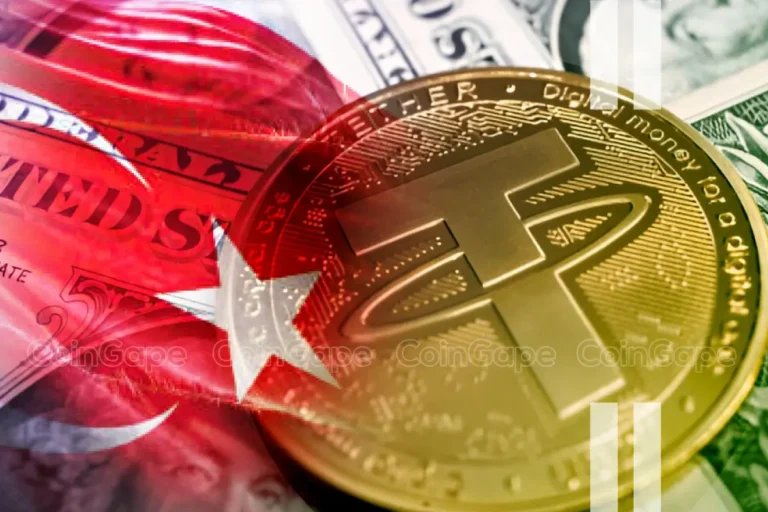Tether Holdings tried to persuade Turkey to use its digital assets to revamp the country’s boron market.
This is the latest evidence that key players in the crypto industry are looking to leverage the commodity sector for further growth.
Boron on the blockchain: Tether’s Turkish gambit
Stablecoin issuer Tether has submitted a government plan to use blockchain to digitally tokenize borate minerals, according to anonymous sources. The idea of establishing a digital asset exchange in the financial capital Istanbul is also being floated, according to people familiar with the matter.
The Boroncoin proposal represents an early stage of tokenization. Supporters say it can modernize some markets.
Other major application areas for boron products include ceramics, detergents, fertilizers, and glass. Turkey controls more than 70% of the world’s reserves, according to state-run mining company Eti Maden Isletmeleri Jenel Mudlug. The government projects revenue for 2024 to be approximately $1.3 billion.
Tether’s interests in Turkey, more precisely its focus on boron, raise eyebrows as far as the strategic benefits of the proposed transaction are concerned. Although there is no clear reason, Turkey’s economic profile has made it a destination for digital asset companies.
Still, Tether is not the only company interested in Türkiye’s crypto space. Just recently, leading Turkish bank Garanti BBVA Crypto announced a partnership with Ripple Inc. and IBM to provide enhanced and secure cryptocurrency trading and custody services to its customers.
High inflation and a weak lira are driving the adoption of cryptocurrencies in Türkiye. According to the latest data from Chainalysis, there will be approximately $137 billion in crypto inflows by June 2023. This has made Turkey one of the most active crypto markets in the world.
Despite these exploratory moves by Tether, Turkish officials remain optimistic. As one government representative stated, the application of the boron proposal is still at an early stage. Another Energy Department official said discussions were still in the “preliminary” stage.
Tether’s Ardoino: Powering Cryptocurrency Innovation in Türkiye
CEO Paolo Ardoino reiterated that the company is ready to drive cryptocurrency innovation in the country and explore ways to expand in the future. The company works with law enforcement agencies in 45 countries, including the FBI and the U.S. Secret Service, and claims to have over-collateralized reserves of 104%. Ardoino recently called for improved cryptocurrency laws in the United States and around the world.
There, Tether’s expansion manager Anadolu Aydinli held talks with various key companies, including Eti Madden’s general manager Yalcin Aydin, Vice President Cevdet Yilmaz, and Energy Minister Alparslan Bayraktar. are. But so far, Türkiye’s energy ministry and presidential palace have provided little official response.
The larger context of these moves highlights Turkey’s growing relevance in the global cryptocurrency market and the potential role it could play in further shaping the country’s digital asset landscape.
As part of the broader cryptocurrency ecosystem, issuers are increasingly seeking expanded financing opportunities for commodity trading companies. This could be a strategy for broader financial applications, leveraging the profits from USDT operations to go deeper into the integration of hard assets and their payment systems.
USDT is backed by conservative investments such as U.S. Treasuries and has watched profits swell. It is said to have earned a record $5.2 billion in the first half of 2024.
USDT is finding its way with commodity producers and brokers in sanctioned countries such as Venezuela and Russia. These countries have partial access to the global banking system through partial access due to US sanctions.
This has created a trend that poses challenges for regulators in their efforts to track and control global financial flows, with increased adoption of crypto assets in sanctioned countries. Tether’s involvement in some way signals Tether’s broader ambitions in both the cryptocurrency and traditional financial sectors.
USDT: The future of finance in emerging markets?
USDT is the world’s largest stablecoin issued by Tether, and is fixed at a constant price of 1 US dollar = 1 dollar. Stablecoins dominate the cryptocurrency ecosystem, with their circulating supply increasing to $120 billion. This has become one of the most popular ways for traders to store value and provide liquidity between exchanges during volatile markets.
Beyond transactions, the issuer is also positioning USDT as a cheap and fast payment method, especially in emerging markets. In countries where access to the US dollar is more difficult, its stablecoins are a way to bypass the traditional banking system and move to a system with far less friction and fees to move value. This feature is especially important in countries under pressure from inflation, where stablecoins have proven to be a sound alternative for trading and saving.
Stablecoin issuers believe that by leveraging blockchain technology, coins can become a viable alternative to banking services, especially in regions where financial infrastructure is poorly developed or completely ineffective. We would like to expand the role of USDT.
✓ Share:
Teuta
Teuta is a veteran writer and editor with over 15 years of experience in the macroeconomics, technology, cryptocurrency and blockchain industries. He started his career in 2005 as a lifestyle writer for Cosmopolitan magazine in Croatia and went on to cover business and economics for prestigious publications such as Forbes and Bloomberg. Influenced by figures like Don Tapscott and Bruce Dickinson, Teuta embraced the blockchain revolution, believing that cryptocurrencies are one of humanity’s most important inventions. Her fintech journey began in 2014 and focused on cryptocurrencies, blockchain, NFTs, and Web3. Known for his excellent teamwork and communication skills, Teuta holds a double master’s degree in political science and law, loves punk rock and Chablis, and has a passion for shoes.
Disclaimer: The content presented may contain the personal opinion of the author and is subject to market conditions. Do your market research before investing in cryptocurrencies. The author or publication assumes no responsibility for your personal financial loss.


